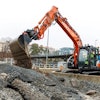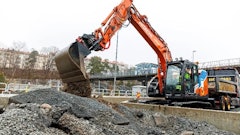Construction employment increased in December by 17,000 driven by gains in nonresidential construction employment, according to an analysis of new federal employment data released by the Associated General Contractors of America. Association officials says that construction employment likely benefitted from unseasonably warm weather across much of the country that extended the construction season.
“Nonresidential construction is clearly driving last month’s employment gains,” says Ken Simonson, the association’s chief economist. “But it is too early to tell whether those gains came because the weather was good enough for crews to keep working well into December or because demand is truly rebounding.”
Total construction employment now stands at 5,544,000 or 0.3% higher than a month earlier and 46,000 (0.8%) higher than in December 2010, the economist says. He adds that the latest employment figures continue a months-long trend of slight gains followed by slight declines in construction employment and that overall construction employment is still far below its peak level of 7,726,000 in April 2006.
The nonresidential construction sector added 17,200 construction jobs in December, Simonson notes. He says nonresidential specialty trade contractors added 20,200 positions, while heavy and civil engineering construction firms – which perform the majority of publicly-funded construction work – shed 300 jobs. Nonresidential building contractors shed 2,700 jobs in December. Residential construction lost 400 total jobs, as the residential specialty trade contractors shed 2,900 jobs and residential builder added only 2,500 positions in December.
Association officials say the increase in construction jobs was welcome news, but say they were concerned that partisan fighting in Washington would undermine chances of enacting a number of long-overdue infrastructure investment programs and measures needed to boost the economy. Without those measures construction employment was likely to suffer.
"It is going to be hard to pass tax and investment measures to help boost private sector demand when congress and the president are at odds about everything from appointments to how to curb growing federal deficits,” says Stephen E. Sandherr, the association’s chief executive officer. “When elected officials are more interested in scoring political points than addressing our critical infrastructure needs, everybody else – including unemployed construction workers and the economy – suffers.”


















